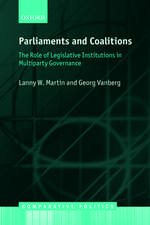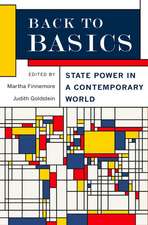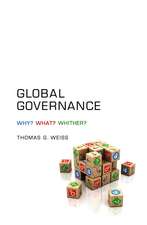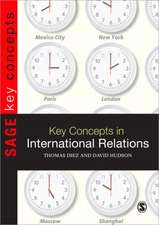Conflict Resolution: SAGE Library of International Relations
Editat de Daniel Druckman, Paul F. Diehlen Limba Engleză Hardback – 13 iun 2006
Part I: Theory and Concepts
Part II: Methods and Evaluation
Part III: Techniques/Approaches
Part IV: Long Term Resolution
Din seria SAGE Library of International Relations
- 14%
 Preț: 5403.97 lei
Preț: 5403.97 lei - 26%
 Preț: 5444.43 lei
Preț: 5444.43 lei - 26%
 Preț: 5094.64 lei
Preț: 5094.64 lei - 26%
 Preț: 4936.48 lei
Preț: 4936.48 lei - 26%
 Preț: 6807.70 lei
Preț: 6807.70 lei - 26%
 Preț: 5826.51 lei
Preț: 5826.51 lei - 11%
 Preț: 4551.41 lei
Preț: 4551.41 lei - 26%
 Preț: 4939.53 lei
Preț: 4939.53 lei - 16%
 Preț: 5259.50 lei
Preț: 5259.50 lei - 16%
 Preț: 5252.14 lei
Preț: 5252.14 lei - 26%
 Preț: 4940.12 lei
Preț: 4940.12 lei - 16%
 Preț: 3906.67 lei
Preț: 3906.67 lei - 16%
 Preț: 5251.65 lei
Preț: 5251.65 lei - 16%
 Preț: 5251.10 lei
Preț: 5251.10 lei - 11%
 Preț: 5253.08 lei
Preț: 5253.08 lei - 11%
 Preț: 5252.10 lei
Preț: 5252.10 lei - 11%
 Preț: 7247.29 lei
Preț: 7247.29 lei - 11%
 Preț: 5253.31 lei
Preț: 5253.31 lei - 26%
 Preț: 4940.04 lei
Preț: 4940.04 lei - 26%
 Preț: 4942.07 lei
Preț: 4942.07 lei - 26%
 Preț: 4941.65 lei
Preț: 4941.65 lei - 11%
 Preț: 5253.21 lei
Preț: 5253.21 lei - 11%
 Preț: 4547.40 lei
Preț: 4547.40 lei - 16%
 Preț: 5513.72 lei
Preț: 5513.72 lei - 26%
 Preț: 5188.93 lei
Preț: 5188.93 lei - 26%
 Preț: 5442.37 lei
Preț: 5442.37 lei - 11%
 Preț: 5513.61 lei
Preț: 5513.61 lei - 26%
 Preț: 5190.05 lei
Preț: 5190.05 lei - 26%
 Preț: 9215.99 lei
Preț: 9215.99 lei - 26%
 Preț: 8804.00 lei
Preț: 8804.00 lei - 26%
 Preț: 5092.82 lei
Preț: 5092.82 lei - 26%
 Preț: 5094.83 lei
Preț: 5094.83 lei
Preț: 6350.80 lei
Preț vechi: 6978.90 lei
-9% Nou
Puncte Express: 9526
Preț estimativ în valută:
1215.19€ • 1272.19$ • 1005.52£
1215.19€ • 1272.19$ • 1005.52£
Carte tipărită la comandă
Livrare economică 07-21 aprilie
Preluare comenzi: 021 569.72.76
Specificații
ISBN-13: 9781412921879
ISBN-10: 1412921872
Pagini: 2076
Dimensiuni: 156 x 234 mm
Greutate: 3.83 kg
Ediția:Five-Volume Set
Editura: SAGE Publications
Colecția Sage Publications Ltd
Seria SAGE Library of International Relations
Locul publicării:London, United Kingdom
ISBN-10: 1412921872
Pagini: 2076
Dimensiuni: 156 x 234 mm
Greutate: 3.83 kg
Ediția:Five-Volume Set
Editura: SAGE Publications
Colecția Sage Publications Ltd
Seria SAGE Library of International Relations
Locul publicării:London, United Kingdom
Cuprins
PART ONE: THEORY AND CONCEPTS
Origins of the Field
The Analysis of Social Conflict - R W Mack and R C Snyder
Toward an Overview and Synthesis
Some Conceptual Difficulties in the Theory of Social Conflict - C F Fink
The Development of the Conflict Resolution Field - L Kriesberg
Key Concepts and Distinctions
Types of Conflict
Competition and Dissensus - V Aubert
Two Types of Conflict and of Conflict Resolution
New Directions in Research on Conflict Resolution - K Hammond
A Cognitive Interaction Model to Analyze Culture Conflict in International Relations - E S Glenn, R H Johnson, P R Kimmel and B Wedge
Conflict of Interest and Value Dissensus - D Druckman and K Zechmeister
Propositions in the Sociology of Conflict
Stages of Conflict Resolution
Re-Conceptualizing Conflict Resolution as a Three-Stage Process - B Walter
Group and National Identity
Isolation and Collaboration - H Guetzkow
A Partial Theory of Inter-Nation Relations
Origins and Effects of Group Ethnocentrism and Nationalism - P C Rosenblatt
Nationalism, Patriotism, and Group Loyalty - D Druckman
A Social Psychological Perspective
Relative Deprivation
Relative Deprivation as a Key Social Psychological Concept - T F Pettigrew
Interdependence and Strategic Interaction
Bargaining, Communication and Limited War - T C Schelling
Effective Choice in the Prisoner's Dilemma - R Axelrod
Theory of Moves - S J Brams
Boundary Roles
A Behavioral Theory of Labor Negotiations - R E Walton and R B McKersie
The Structure and Dynamics of Behaviour in the Organizational Boundary Roles - J S Adams
Boundary Role Conflict - D Druckman
Negotiation as Dual Responsiveness
Diplomacy and Domestic Politics - R Putnam
The Logic of Two-Level Games
Ripeness and Hurting Stalemates
The Right Moment - C Mitchell
Notes on Four Models of Ripeness
Ripeness - I W Zartman (2000)
The Hurting Stalemate and Beyond
Responsiveness
The Norm of Reciprocity - A W Gouldner
Stability and Sudden Change in Interpersonal and International Affairs - D G Pruitt
When Does Reciprocity in the Actions of Nations Occur? - M Patchen
PART TWO: METHODS AND EVALUATION
Standards of Evaluation
Evaluating Peacekeeping Missions - D Druckman and P C Stern
Conflict Management in Enduring Rivalries - G Goertz and P Regan
Evaluating Interventions in History - P C Stern and D Druckman
The Case of International Conflict Resolution
Evaluation Issues in Peace Implementation - G Downs and S Stedman
Methodological Approaches
Simulation, Experimentation, and Context - R B Mahoney and D Druckman
Dimensions of Design and Inference
Third-Party Intervention - N B McGillicuddy, G L Welton and D G Pruitt
A Field Experiment Comparing Three Different Models
Determinants of Compromising Behavior in Negotiation - D Druckman
A Meta-Analysis
Finding Harbingers of Violent Conflict - P Brecke
Using Pattern Recognition to Anticipate Conflicts
PART THREE: TECHNIQUES/APPROACHES
Early Warning and Preventive Diplomacy
Early Warning and Preventive Diplomacy - M Lund
Crisis Bargaining
When Will They Ever Learn - R Leng
Coercive Bargaining in Recurrent Crises
Signaling Versus the Balance of Power and Interests - J Fearon
An Empirical Test of the Crisis Bargaining Model
Peacekeeping
International Peacekeeping and Conflict Resolution - P Diehl, D Druckman and J Wall
Where Do Peacekeepers Go? Mediation - M Gilligan and S Stedman
Definitional/Conceptual
Intermediaries - O R Young
Additional Thoughts on Third Parties
Origins
Devious Objectives and the Disputants' View of International Mediation - O Richmond
A Theoretical Framework
Who Mediates? The Political Economy of International Conflict Management - J Bercovitch and G Schneider
Stepping Into the Fray - JM Greig
When Do Mediators Mediate?
Process
Why Do They Do It Like This? An Analysis of the Factors Influencing Mediation Behaviour in International Conflicts - J Bercovitch and A Houston
Moments of Opportunity - J M Greig
Recognizing Conditions of Ripeness for International Mediation Between Enduring Rivals
Which Side are You On? Bias, Credibility and Mediation - A Kydd and B Walter
An Event Data Analysis of Third-Party Mediation - P A Schrodt and D J Gerner
Outcomes
The Nature of the Dispute and the Effectiveness on International Mediation - J Bercovitch and J Langley
Understanding Success and Failure of International Mediation - M Kleiboer
Mediating International Crises - J Wilkenfeld et al
Cross-National and Experimental Perspectives
Culture
Social and Political Cultural Effects on the Outcomes of Mediation in Militarized Interstate Disputes - R Leng and P Regan
Adaptive Third Parties in a Cultural Milieu - P J Carnevale et al
Community Mediation in the People's Republic of China - J A Wall and M Blum
Democracy and the Peaceful Settlement of International Conflict - W Dixon
Negotiation
Frameworks
Bargaining and Negotiation in International Relations - J Sawyer and H Guetzkow
Two Paradigms of Negotiation - P T Hopmann
Relational Frames and Their Ethical Implications in International Negotiation - Bargaining and Problem SolvingW A Donohue and G D Hoobler
An Analysis Based on the Oslo II Negotiations
Stages
The Peaceful Settlement of Industrial and Intergroup Disputes - A Douglas
Stages, Crises and Turning Points - D Druckman
Negotiating Military Base Rights, Spain and the United States
Process
Negotiation as a Learning Process - J G Cross
An Application of a Richardson Process Model - P T Hopmann and T C Smith
Soviet-American Interactions in the Test-Ban negotiations, 1062-1963
Negotiating Strategic Arms Control, 1969-1979 - L Jensen
Turning Points in International Negotiation - D Druckman
A Comparative Analysis
Outcomes
Development of Integrative Solutions in Bilateral Negotiation - D G Pruitt and S A Lewis
Culture
Some Determinants of Reactions to Procedural Models of Conflict Resolution - K Leung
A Cross-National Study
Explorations of Negotiations in Ten Foreign Cultures Using a Model Developed in the United States - J L Graham, A T Minyu and W Rodgers
Cultural Dimensions of Negotiation - P J Carnevale and K Leung
Interactive Conflict Resolution
The Problem-Solving Workshop in Conflict Resolution - H C Kelman
Third-Party Consultation as a Method of Conflict Resolution - R J Fisher
A Review of Studies
Legal
Decisions to Use the International Court of Justice - D Fischer
Four Recent Cases
Capacity, Commitment and Compliance - B Simmons
International Institutions and Territorial Disputes
Intervention and Military Force
Conditions of Successful Third-Party Intervention in Intrastate Conflicts - P Regan
Possible and Impossible Solutions to Ethnic Civil Wars - C Kaufman
PART FOUR: LONG TERM RESOLUTION
Implementation of Agreements
Spoiler Problems in Peace Processes - S Stedman
The Precarious Nature of Peace - S Werner
Resolving the Issues, Enforcing the Settlement and Renegotiating the Terms
Reconciliation/Transformation
Conflict Transformation in Protracted Internal Conflicts - J P Lederach
The Case for a Comprehensive Framework
Long-Term Stability
Does Peacekeeping Keep Peace? International Intervention and the Duration of Peace after Civil War - VP Fortna
Keeping the Peace After Secessions: Territorial Conflict between Rump and Secessionist States - J Tir
International Peacebuilding - M Doyle and N Sambanis
A Theoretical and Quantitative Analysis
Origins of the Field
The Analysis of Social Conflict - R W Mack and R C Snyder
Toward an Overview and Synthesis
Some Conceptual Difficulties in the Theory of Social Conflict - C F Fink
The Development of the Conflict Resolution Field - L Kriesberg
Key Concepts and Distinctions
Types of Conflict
Competition and Dissensus - V Aubert
Two Types of Conflict and of Conflict Resolution
New Directions in Research on Conflict Resolution - K Hammond
A Cognitive Interaction Model to Analyze Culture Conflict in International Relations - E S Glenn, R H Johnson, P R Kimmel and B Wedge
Conflict of Interest and Value Dissensus - D Druckman and K Zechmeister
Propositions in the Sociology of Conflict
Stages of Conflict Resolution
Re-Conceptualizing Conflict Resolution as a Three-Stage Process - B Walter
Group and National Identity
Isolation and Collaboration - H Guetzkow
A Partial Theory of Inter-Nation Relations
Origins and Effects of Group Ethnocentrism and Nationalism - P C Rosenblatt
Nationalism, Patriotism, and Group Loyalty - D Druckman
A Social Psychological Perspective
Relative Deprivation
Relative Deprivation as a Key Social Psychological Concept - T F Pettigrew
Interdependence and Strategic Interaction
Bargaining, Communication and Limited War - T C Schelling
Effective Choice in the Prisoner's Dilemma - R Axelrod
Theory of Moves - S J Brams
Boundary Roles
A Behavioral Theory of Labor Negotiations - R E Walton and R B McKersie
The Structure and Dynamics of Behaviour in the Organizational Boundary Roles - J S Adams
Boundary Role Conflict - D Druckman
Negotiation as Dual Responsiveness
Diplomacy and Domestic Politics - R Putnam
The Logic of Two-Level Games
Ripeness and Hurting Stalemates
The Right Moment - C Mitchell
Notes on Four Models of Ripeness
Ripeness - I W Zartman (2000)
The Hurting Stalemate and Beyond
Responsiveness
The Norm of Reciprocity - A W Gouldner
Stability and Sudden Change in Interpersonal and International Affairs - D G Pruitt
When Does Reciprocity in the Actions of Nations Occur? - M Patchen
PART TWO: METHODS AND EVALUATION
Standards of Evaluation
Evaluating Peacekeeping Missions - D Druckman and P C Stern
Conflict Management in Enduring Rivalries - G Goertz and P Regan
Evaluating Interventions in History - P C Stern and D Druckman
The Case of International Conflict Resolution
Evaluation Issues in Peace Implementation - G Downs and S Stedman
Methodological Approaches
Simulation, Experimentation, and Context - R B Mahoney and D Druckman
Dimensions of Design and Inference
Third-Party Intervention - N B McGillicuddy, G L Welton and D G Pruitt
A Field Experiment Comparing Three Different Models
Determinants of Compromising Behavior in Negotiation - D Druckman
A Meta-Analysis
Finding Harbingers of Violent Conflict - P Brecke
Using Pattern Recognition to Anticipate Conflicts
PART THREE: TECHNIQUES/APPROACHES
Early Warning and Preventive Diplomacy
Early Warning and Preventive Diplomacy - M Lund
Crisis Bargaining
When Will They Ever Learn - R Leng
Coercive Bargaining in Recurrent Crises
Signaling Versus the Balance of Power and Interests - J Fearon
An Empirical Test of the Crisis Bargaining Model
Peacekeeping
International Peacekeeping and Conflict Resolution - P Diehl, D Druckman and J Wall
Where Do Peacekeepers Go? Mediation - M Gilligan and S Stedman
Definitional/Conceptual
Intermediaries - O R Young
Additional Thoughts on Third Parties
Origins
Devious Objectives and the Disputants' View of International Mediation - O Richmond
A Theoretical Framework
Who Mediates? The Political Economy of International Conflict Management - J Bercovitch and G Schneider
Stepping Into the Fray - JM Greig
When Do Mediators Mediate?
Process
Why Do They Do It Like This? An Analysis of the Factors Influencing Mediation Behaviour in International Conflicts - J Bercovitch and A Houston
Moments of Opportunity - J M Greig
Recognizing Conditions of Ripeness for International Mediation Between Enduring Rivals
Which Side are You On? Bias, Credibility and Mediation - A Kydd and B Walter
An Event Data Analysis of Third-Party Mediation - P A Schrodt and D J Gerner
Outcomes
The Nature of the Dispute and the Effectiveness on International Mediation - J Bercovitch and J Langley
Understanding Success and Failure of International Mediation - M Kleiboer
Mediating International Crises - J Wilkenfeld et al
Cross-National and Experimental Perspectives
Culture
Social and Political Cultural Effects on the Outcomes of Mediation in Militarized Interstate Disputes - R Leng and P Regan
Adaptive Third Parties in a Cultural Milieu - P J Carnevale et al
Community Mediation in the People's Republic of China - J A Wall and M Blum
Democracy and the Peaceful Settlement of International Conflict - W Dixon
Negotiation
Frameworks
Bargaining and Negotiation in International Relations - J Sawyer and H Guetzkow
Two Paradigms of Negotiation - P T Hopmann
Relational Frames and Their Ethical Implications in International Negotiation - Bargaining and Problem SolvingW A Donohue and G D Hoobler
An Analysis Based on the Oslo II Negotiations
Stages
The Peaceful Settlement of Industrial and Intergroup Disputes - A Douglas
Stages, Crises and Turning Points - D Druckman
Negotiating Military Base Rights, Spain and the United States
Process
Negotiation as a Learning Process - J G Cross
An Application of a Richardson Process Model - P T Hopmann and T C Smith
Soviet-American Interactions in the Test-Ban negotiations, 1062-1963
Negotiating Strategic Arms Control, 1969-1979 - L Jensen
Turning Points in International Negotiation - D Druckman
A Comparative Analysis
Outcomes
Development of Integrative Solutions in Bilateral Negotiation - D G Pruitt and S A Lewis
Culture
Some Determinants of Reactions to Procedural Models of Conflict Resolution - K Leung
A Cross-National Study
Explorations of Negotiations in Ten Foreign Cultures Using a Model Developed in the United States - J L Graham, A T Minyu and W Rodgers
Cultural Dimensions of Negotiation - P J Carnevale and K Leung
Interactive Conflict Resolution
The Problem-Solving Workshop in Conflict Resolution - H C Kelman
Third-Party Consultation as a Method of Conflict Resolution - R J Fisher
A Review of Studies
Legal
Decisions to Use the International Court of Justice - D Fischer
Four Recent Cases
Capacity, Commitment and Compliance - B Simmons
International Institutions and Territorial Disputes
Intervention and Military Force
Conditions of Successful Third-Party Intervention in Intrastate Conflicts - P Regan
Possible and Impossible Solutions to Ethnic Civil Wars - C Kaufman
PART FOUR: LONG TERM RESOLUTION
Implementation of Agreements
Spoiler Problems in Peace Processes - S Stedman
The Precarious Nature of Peace - S Werner
Resolving the Issues, Enforcing the Settlement and Renegotiating the Terms
Reconciliation/Transformation
Conflict Transformation in Protracted Internal Conflicts - J P Lederach
The Case for a Comprehensive Framework
Long-Term Stability
Does Peacekeeping Keep Peace? International Intervention and the Duration of Peace after Civil War - VP Fortna
Keeping the Peace After Secessions: Territorial Conflict between Rump and Secessionist States - J Tir
International Peacebuilding - M Doyle and N Sambanis
A Theoretical and Quantitative Analysis
Descriere
How international conflict might be managed or resolved is a major focal point of a very large and growing body of scholarly research. This four-volume set provides an intellectual history to the fields of conflict management and resolution as well as some of the best contemporary research on the subject. Incorporating over 80 articles, the volumes also include a number of classic works that have been critical in setting the conceptual and theoretical underpinnings of research today. The result is a wide-ranging collection encompassing many topics and streams of research over several decades from a number of disciplinary heritages including political science, social psychology and economics.











